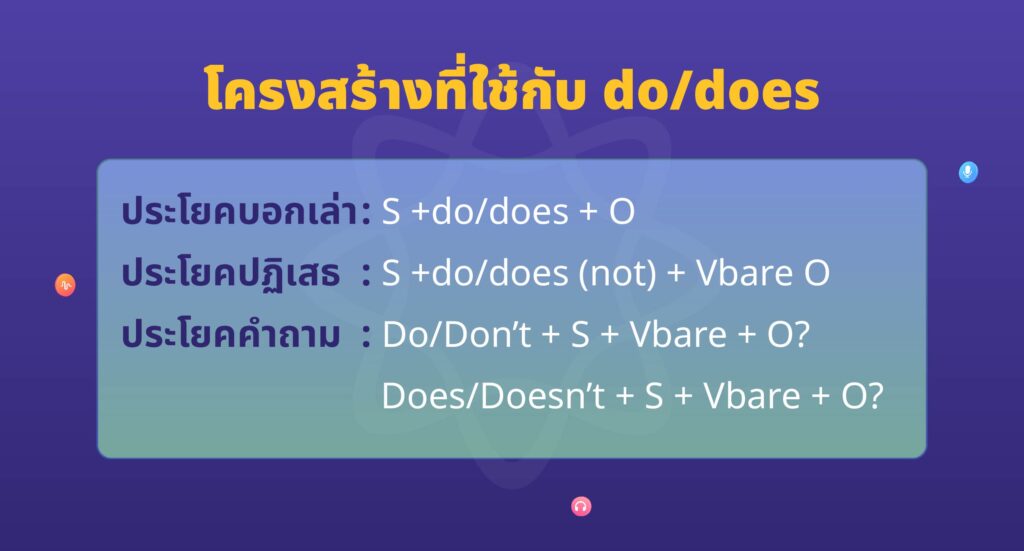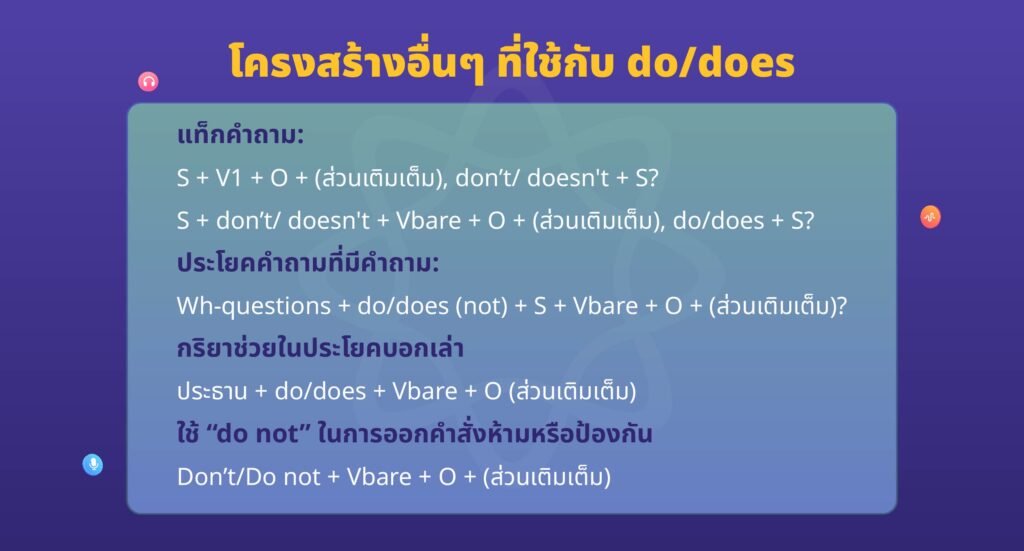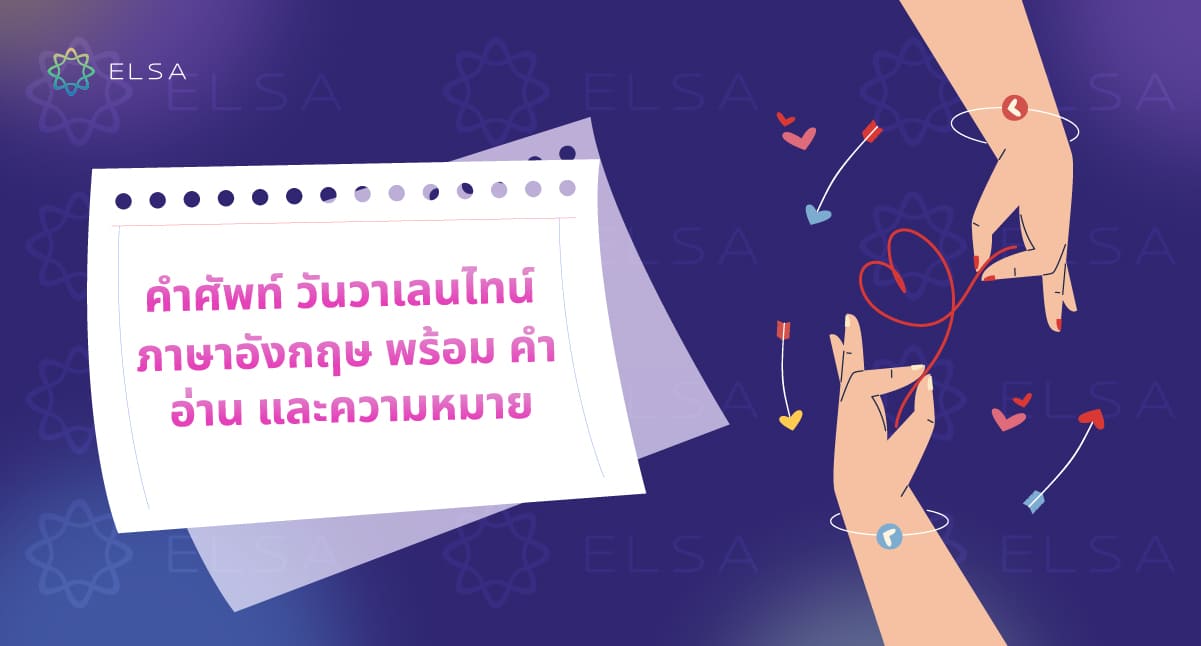กริยาช่วย do และ does เป็นไวยากรณ์พื้นฐานที่ผู้เรียนภาษาอังกฤษได้เรียนในบทเรียนมาบ้างแล้ว แต่เมื่อไหร่ถึงจะใช้ do does ก็ยังคงเป็นความท้าทายสำหรับผู้เรียนหลายคน ดังนั้นบทความนี้จะให้ผู้เรียนรู้ว่า do does ใช้ยังไง คำจำกัดความและการใช้งานที่เกี่ยวข้องกับไวยากรณ์พร้อมทั้งแบบฝึกหัดและเฉลยแก่ผู้เรียนด้วย
คำจำกัดความ do does
“Do” เป็นคำกริยาที่พิเศษซึ่งจะเปลี่ยนไปตามคำนาม: do และ does หรือเปลี่ยนไปตาม: did และ Done อย่างไรก็ตาม do และ does ส่วนใหญ่จะใช้เป็นกริยาช่วย ในประโยคบอกเล่า do และ does มีโครงสร้างดังนี้: ประธาน + do/does + กรรม
สอบก่อนเข้าฟรี

S +do/does + O
ตัวอย่าง:
● I do my homework really fast. (ฉันทำการบ้านเร็วมาก)
● He does the housework to help his mom. (เขาช่วยแม่ทำความสะอาดบ้าน)
เมื่อไหร่ถึงจะใช้ do does
เมื่อไหร่ถึงจะใช้ “do”
“Do” มีหลายความหมาย เช่น ทำ ดำเนินการ บรรลุ เสร็จสมบูรณ์ และมักใช้กับบุรุษสรรพนามพหูพจน์ เช่น “you we they” และกรณีพิเศษคือใช้กับ “I” เช่นเดียวกับคำนามพหูพจน์อื่นๆ ที่นับได้
ในประโยคปฏิเสธ
นอกเหนือจากการทำหน้าที่เป็นคำกริยาปกติที่มีความหมายตามที่กล่าวข้างต้นแล้ว “do” ยังใช้เป็นคำกริยาช่วยในประโยคปฏิเสธที่มีโครงสร้าง: ประธาน + do + not + infinitive + กรรม
S + do + not + Vbare + O
ตัวอย่าง:
● I do not like horror movies. (ฉันไม่ชอบหนังสยองขวัญ)
● We do not order this dish. (อาหารจานนี้เราไม่ได้สั่ง)
หมายเหตุ: “do not” สามารถย่อเป็น “don’t” ได้
ตัวอย่าง:
● They don’t drink coffee. (พวกเขาไม่ดื่มกาแฟ)
● I don’t go to school today. (วันนี้ฉันไม่ได้ไปโรงเรียน)
ในคำถามที่มีประธาน: I you we they
เมื่อใช้ในประโยคคำถาม “do” จะมีโครงสร้างที่แตกต่างจากประโยคปฏิเสธและประโยคบอกเล่า เพราะกริยาช่วย “do” จะขึ้นต้นประโยคโดยมีโครงสร้างดังนี้: Do/Don’t + ประธาน + infinitive + กรรม?
Do/Don’t + S + Vbare + O?
ตัวอย่าง:
● Do I wait here? (ฉันต้องรออยู่ที่นี่เหรอ?)
● Do they walk to school? (พวกเขาเดินไปโรงเรียนใช่ไหม?)
● Don’t we have homework? (เราไม่มีการบ้านใช่ไหม?)
● Don’t you need my car? (คุณไม่ต้องการรถของฉันแล้วเหรอ?)
เมื่อใดจะใช้ “does”
“Does” เป็นรูปแบบดัดแปลงของ “do” มักใช้ร่วมกับบุรุษสรรพนาม เช่น “he/she/it” คำนามเอกพจน์ หรือคำนามนับไม่ได้ (water, music, homework,…).
ในประโยคปฏิเสธ
เช่นเดียวกับ “do” นอกเหนือจากการทำหน้าที่เป็นคำกริยาปกติแล้ว “does” ยังใช้เป็นกริยาช่วยในประโยคปฏิเสธที่มีโครงสร้าง: ประธาน + does + not + infinitive + กรรม
S + does + not + Vbare + O
ตัวอย่าง:
● He does not live here. (เขาไม่ได้อาศัยอยู่ที่นี่)
● It does not work. (มันไม่ทำงาน)
● The music does not sound good at all. (เพลงนี้ไม่เพราะเลย)
หมายเหตุ: “does not” สามารถย่อเป็น “doesn’t” ได้
ตัวอย่าง:
● She doesn’t want to meet him. (เธอไม่อยากพบเขา)
● It doesn’t move when I touch it. (เมื่อฉันเตะมัน มันไม่ขยับเลย)
● The water doesn’t flow. (น้ำไม่ไหล)
ในประโยคคำถาม
ในประโยคคำถามจะมีโครงสร้างที่แตกต่างจากประโยคปฏิเสธและประโยคบอกเล่า นั้นคือกริยาช่วย “Does” จะอยู่ที่ต้นประโยคโดยมีโครงสร้าง: Does/Doesn’t + ประธาน + infinitive + กรรม?
Does/Doesn’t + S + Vbare + O ?
ตัวอย่าง:
● Does he know about us? (เขารู้เรื่องของเราไหม?)
● Does it bite? (มันกัดไหม?)
● Doesn’t she have a meeting to attend? (เธอต้องเข้าร่วมประชุมไหม?)

วิธีใช้ ‘do’ และ ‘does’ ใน Tag questions และ Wh-questions
ในท้ายประโยค (Tag questions)
ในคำถามท้ายประโยค กริยาช่วย “do/does” จะไม่อยู่ต้นประโยคเหมือนกับคำถามปกติ แต่จะเปลี่ยนไปตามโครงสร้างสองอย่างต่อไปนี้:
S + V1 + O, don’t/doesn’t + S?
S + don’t/doesn’t + Vbare + O, do/does + S?
ตัวอย่าง:
● They cook the dinner, don’t they? (พวกเขาทำอาหารเย็นใช่ไหม)
● I don’t have to come to the party, do I? (ฉันไม่จำเป็นต้องมางานปาร์ตี้ใช่ไหม?)
● She cleans the house, doesn’t she? (เธอทำความสะอาดบ้านใช่ไหม?)
● He doesn’t need the pen, does he? (เขาไม่ต้องการปากกาใช่ไหม?)
ในประโยคคำถามที่มีคำถาม (Wh-questions)
สำหรับคำถามที่มีคำตั้งคำถาม กริยาช่วย do/does จะอยู่หลังคำที่ใช้เพื่อถามซึ่งมีโครงสร้างดังนี้:
คำใช้เพื่อถาม (Wh-questions)+ do/does (not) + S + Vbare + O?
ตัวอย่าง:
● How do you go to work? (คุณไปทำงานยังไง?)
● Where does she live? (เธออาศัยอยู่ที่ไหน?)
● Why doesn’t he rest? (ทำไมเขาถึงไม่พักผ่อน?)
● What do they want for dinner? (คืนนี้พวกเขาอยากกินอะไร?)
>>> Read more:
หมายเหตุกรณีพิเศษเมื่อใช้ ‘do’ และ ‘does’
ใช้ “do/does” เป็นกริยาช่วยในประโยคบอกเล่า
สำหรับวิธีการใช้คำเหล่านี้ ผู้เรียนควรใช้เฉพาะสนทนาหรือการเขียนแบบไม่เป็นทางการ และควรใช้กับกริยาช่วยบางคำ เช่น ““like need want love hate…” โดยมีวัตถุประสงค์เพื่อเน้นย้ำความรู้สึก แสดงความจริงใจของตัวเองด้วยโครงสร้างดังนี้:
S + do/does + V Bare + O
ตัวอย่าง:
● I really do love you. (เน้นว่าฉันรักคุณจริงๆ)
● She does need to go to the hospital now. (เน้นว่าตอนนี้เธอต้องไปโรงพยาบาลจริงๆ)
● They do want to meet you. (เน้นว่าพวกเขาอยากพบคุณจริงๆ)
ใช้ “do not” ในการออกคำสั่งห้ามหรือป้องกัน
กรณีนี้เป็นกรณีที่กริยาช่วย “do not” จะมาขึ้นต้นประโยคโดยไม่จำเป็นต้องอยู่ในรูปแบบคำถามกับโครงสร้างดังนี้:
Don’t/Do not + Vbare + O
ตัวอย่าง:
● Don’t pet the cat. (อย่าแตะลูกแมว)
● Don’t disturb the students while they are taking their exam. (อย่ารบกวนนักเรียนในขณะที่เขากำลังทำข้อสอบ)
● Do not smoke in the library. (ห้ามสูบบุหรี่ในห้องสมุด)

แบบฝึกหัดการใช้งาน
แบบฝึกหัด
แบบฝึกหัดที่ 1: เลือกคำตอบที่ถูกต้องที่สุด
Example: Why __________ you always forget your keys at home?
A. do B. does C. did
—> Why do you always for get your keys at home?
- He __________ his best to finish the project on time.
A. do
B. does
C. did - __________ your sister enjoy hiking in the mountains?
A. Do
B. Does
C. Did - The teacher wants her students to complete the homework by tomorrow, __________?
A. does she
B. doesn’t she
C. do they - They __________ like to travel to exotic places during their vacations.
A. do
B. does
C. did - Your parents don’t approve of your decision to study abroad, __________?
A. do they
B. don’t you
C. doesn’t they
แบบฝึกหัดที่ 2: เติมคำว่า “do” หรือ “does” ในช่องว่าง
Example: We do not have enough time to finish the project, __________? → We do not have enough time to finish the project, do we?
- What __________ you enjoy doing in your free time?
- The cat __________ not like to be left alone for too long.
- Maria doesn’t do her laundry on Sundays, __________ she?
- You enjoy swimming in your free time, __________ you?
- How often __________ your friends go out for dinner?
แบบฝึกหัดที่ 3: แก้ไขคำผิดที่เป็นตัวหนา
Example: We does our best to support local businesses. → We do our best to support local businesses.
- Do your sister enjoy hiking in the mountains?
- The teacher does not allows late submissions.
- They don’t likes to attend crowded events.
- She understand the instructions correctly, don’t she?
- Your parents like your boyfriend, does they?
คำตอบ
แบบฝึกหัดที่ 1: เลือกคำตอบที่ถูกต้อง
Example: Why __________ you always forget your keys at home? a. do b. does c. did —> Why do you always for get your keys at home?
- He does his best to finish the project on time. a. do b. does c. did
- Does your sister enjoy hiking in the mountains? a. Do b. Does c. Did
- The teacher wants her students to complete the homework by tomorrow, doesn’t she? a. does she b. doesn’t she c. do they
- They do like to travel to exotic places during their vacations. a. do b. does c. did
- Your parents don’t approve of your decision to study abroad, do they? a. do they b. don’t you c. doesn’t they
แบบฝึกหัดที่ 2: เติมคำว่า “do” หรือ “does” ในช่องว่าง
Example: We do not have enough time to finish the project, __________? → We do not have enough time to finish the project, do we?
- What do you enjoy doing in your free time?
- The cat does not like to be left alone for too long.
- Maria doesn’t do her laundry on Sundays, does she?
- You enjoy swimming in your free time, don’t you?
- How often do your friends go out for dinner?
แบบฝึกหัดที่ 3: แก้ไขคำที่เป็นตัวหนา
Example: We does our best to support local businesses. → We do our best to support local businesses.
- Do your sister enjoy hiking in the mountains? → Does your sister enjoy hiking in the mountains?
- The teacher does not allows late submissions. → The teacher does not allow late submissions.
- They don’t likes to attend crowded events. → They don’t like to attend crowded events.
- She understand the instructions correctly, don’t she? → She understands the instructions correctly, doesn’t she?
- Your parents like your boyfriend, does they? → Your parents like your boyfriend, do they?
คำถามที่พบบ่อย
Do ใช้กับประธานอะไรบ้าง?
Do เป็นคำกริยาที่พิเศษซึ่งใช้กับสรรพนาม I you we they และคำนามนับพหูพจน์
Does ใช้กับประธานอะไร?
Does ใช้กับคำนามบางคำสรรพนามเท่านั้น นั้นคือ He she it และคำนามเอกพจน์ คำนามนับไม่ได้
Do กับ does ใช้ต่างกันอย่างไร?
“Do” เป็นคำกริยาที่พิเศษที่ใช้กับสรรพนาม “I you we they” และสำหรับคำนามนับพหูพจน์ “Does” เป็นรูปเอกพจน์บุรุษที่ 3 ของ “do” ใช้กับคำสรรพนาม “he she it” คำนามเอกพจน์ และคำนามนับไม่ได้บทความนี้ได้นำความรู้ที่สำคัญเกี่ยวเมื่อไหร่ที่ต้องใช้ do หรือ does นอกเหนือจากการทำแบบฝึกหัดทั้ง 3 แบบข้างต้นแล้ว ผู้เรียนควรฝึกทำแบบฝึกหัดอื่นๆเพิ่มเติมที่บ้านเพื่อให้เข้าใจ do does ใช้ยังไง หลักไวยากรณ์นี้ได้ดีขึ้น ติดตาม ELSA Speak เพื่อเรียนรู้ไวยากรณ์ภาษาอังกฤษเพิ่มเติมทุกวันนะ!





